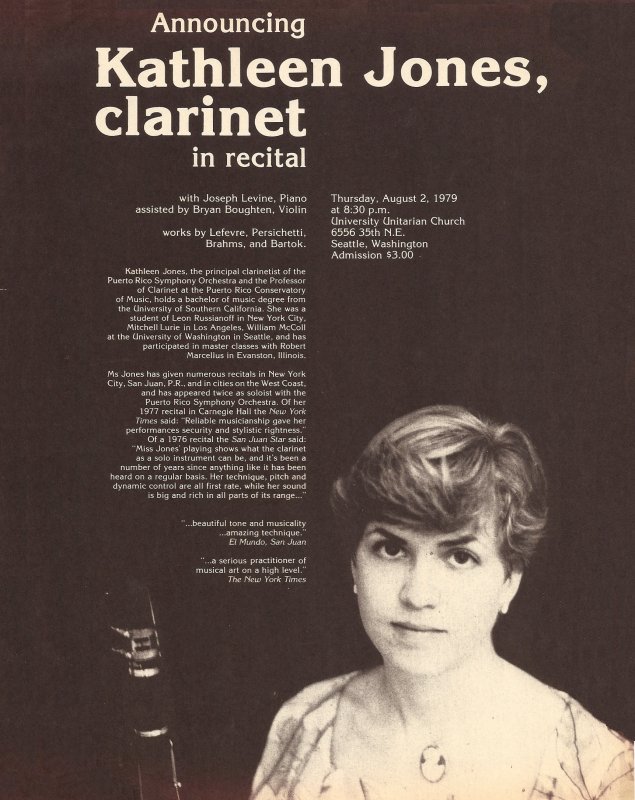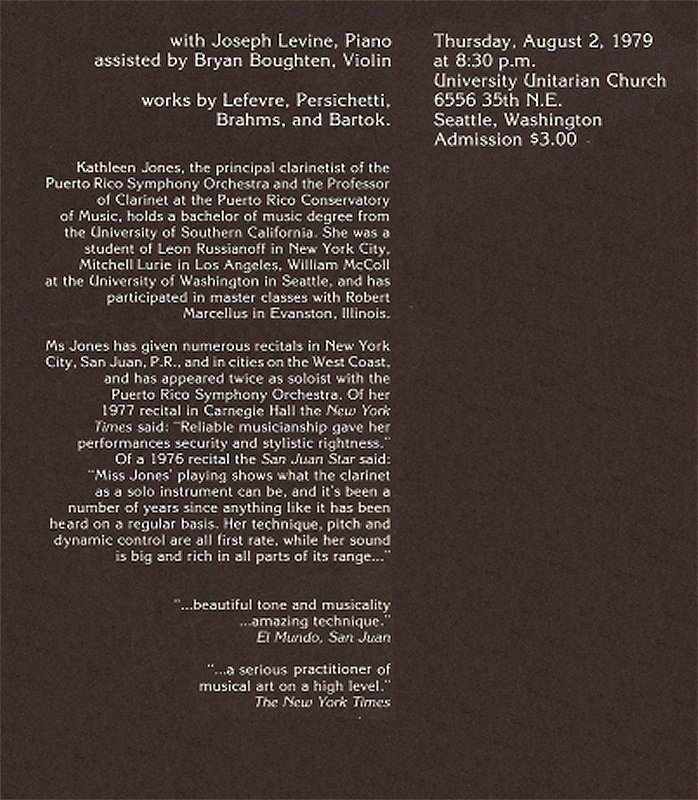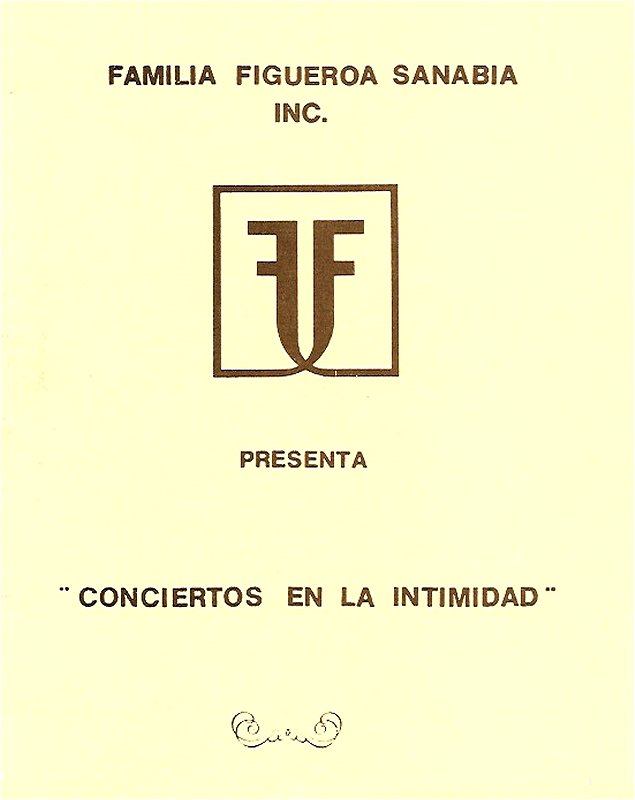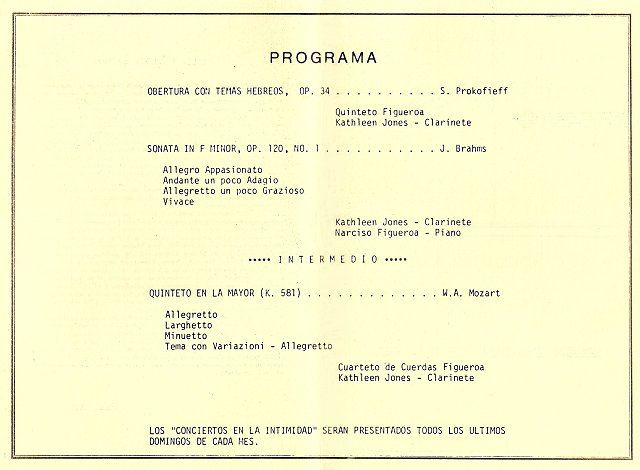

I returned from a great summer, which included successful performances, in Evanston, as well as Seattle.
The Puerto Rico Symphony’s master agreement was ratified on September 10th (1979,) and we began rehearsing the following night under our new music director, John Barnett.
On September 25th a new building was inaugurated on the Conservatory grounds for the use of the Children’s String Program (Programa de Cuerdas para Niños,) a pet project of Casals’ widow, Martita, intended to help stimulate interest in playing string instruments. Let it be noted that students from this program have risen to tremendous heights, including coprincipal cello at the Met, professor of cello at Indiana University, and principal violist of the Cincinnati Symphony, as well as many extraordinary players in the Puerto Rico Symphony and outstanding teachers at the Conservatory.
The Symphony under John Barnett renewed its commitment to be the orchestra for all of Puerto Rico: we played in Aguas Buenas, Humacao, Cayey, Añasco, Yauco, Ponce, and Morovis, in the beautiful theaters La Perla and the Tapia, as well as in Plaza Carolina, the Cathedral in Old San Juan, WIPR (the government television station,) and Guaynabo’s Municipal Gymnasium. I remember playing a concert in the Campo Rico Pueblo Supermarket, in front of boxes of corn oil and malta. The shoppers loved it!
Our more formal concerts that fall presented Alicia de Larrocha, Itzhak Perlman, and Aurora Ginastera, as well as local stars– violinists José (Papo) Madera and Wilfredo Deglans, and pianists José Ramos-Santana, and Samuel Pérez.
The CMPR was in the process of being accredited for the first time by the Middle States Association. I took my dad to see Palmas del Mar, Dorado and the hot springs in Coamo. My sister Donna came to visit for Christmas, and then the serious sightseeing started. We went shopping in Old San Juan (of course!) and, as well, saw the Casals Museum, the Institute of Puerto Rican Culture and the Adolfo de Hostos Museum (in a former public bath house behind the Tapia Theater.) We took the Bacardi Rum Plant tour and walked through UPR’s exotic Botanical Garden. We visited the Ponce de Leon settlement ruins in Caparra, and took the old ferry across the Loiza River, checking out local arts and crafts nearby. We went to La Parguera to see the phosphorescent bay. Having a visitor was a great reason to explore the beautiful tropical island!
On New Year’s Eve we were invited over to Pucha and Kachiro Figueroa’s house to partake in the festivities. Kachiro was our assistant concertmaster and his wife was a wonderful cook. (Two of their three sons are now members of the Metropolitan Opera Orchestra.) When Donna asked Pucha for her recipe for the delicious chicken gizzards, she replied that she “cooked by ear!” They were kind, gentle, generous people, and their house was full of family, friends and holiday cheer.
Another Figueroa brother, pianist Narciso, and his wife, Eri, invited us for dinner. They lived across the street from the Conservatory. Beloved singer María Esther Robles and her writer husband, Juan Luis Márquez, invited us over also, living near me, close to the beach. During the year we enjoyed other wonderful evenings at the homes of UPR professors Donald and Ani Thompson, and PRSO Argentinian violist José Catanzaro and his lovely wife, Georgi.
So 1980 began with warm friends and family and a sense of roots. On January 17th I played the Weber Quintet with friends in one of the most beautiful settings imaginable—the Butterfly People—a room in Old San Juan with gigantic displays of butterflies, as if alive and flying, on either end of a cozy room furnished with plush couches.
But behind the scenes, tremendous pressures were building at the Casals Festival offices. The 1979 Festival had been cancelled; the 1980 event was being planned by the artistic director, Jorge Mester, and the Board of Directors. I wasn’t privy to the machinations, but what I have deduced is the following: more local players were pressing for the opportunity to audition for principal chairs in the famous orchestra. The conductor/clarinetist (who had not accepted Mester’s offer to share the job with me) was insisting on another audition. The Casals Festival replied that all chairs were open for audition except for principal clarinet. A law suit, supported by the local Musician’s Union (468) was filed and served on the Casals Festival, declaring, among other things, that a Puerto Rican (the conductor/clarinetist) musician was being discriminated against because a North American (I) had been hired.
That did it! Now I was mad. I had been staying out of the fray until those words lit a fuse in me. I was the one working and paying local work dues. Here was the Union President siding with a non-working member, using my local dues to try to take a job from me because I was born elsewhere. I wrote a letter and fired it off to the Union President, with copies to the Governor, the Casals Festival office and all the newspapers. I was the one being discriminated against!
I visited the EEOC (Equal Employment Opportunity Commission) and spoke with a United States government official about the possibility of a counter suit. The stress was tremendous. I was not happy. Worried about a comment made by a colleague I bought a locking gas cap for my car. Jorge Mester got mugged in New York by thugs saying it was because of the Casals Festival. The case went to court in February. I was called as an affected party and testified. Then we started waiting for the verdict.
Life went on. The Figueroa Quintet (brothers Pepito, Kachiro, Guillermo, Rafael and Narciso) invited me to play a chamber music concert with them in the Theater of the Puerto Rico Bar Association, and we had a wonderful time presenting Prokofiev’s Overture on Hebrew Themes, a Brahms Sonata and the Mozart Quintet. The PRSO played at UPR with Renatta Scotto and Plácido Domingo. Mark Piskunov, Byron Janis and Steven DeGroote were other famed soloists that spring. We played in Manati, Mayaguez, Ponce, San German, Corozal, at Plaza Las Americas, the Convention Center, the San Juan Municipal Museum, Plaza de Armas and the Capitolio.
The CMPR was looking for a Dean of Studies and I was a member of the search committee. Rafael Druian (Szell’s concertmaster) had been suggested as a candidate; I called him to see if he was interested. He wasn’t. We kept looking.
On April 30th the beloved, great Puerto Rican ex-governor Luis Muñoz Marin died. Four days of mourning were declared; thousands lined up to pay last respects as the hearse traversed the island. I remember looking out our 15th-story window at the highway below and seeing people, four-deep, standing there for hours, awaiting the sad caravan.
On May 7th the Conservatory approved a scholarship I had proposed for help clarinet players buy new instruments. It was named for the clarinetist father of the Figueroa dynasty—Beca Don Jesús Figueroa. I sold lots of chocolate bars to help kids buy new horns over the years!
The March 24th deadline for the verdict in the court case had long since passed. Finally, on June 4th, four days before the first Festival Casals rehearsal, Judge Carmen Sonia Zayas emitted her verdict: hold a new audition. Mester said he would resign before he would do that. The Board immediately appealed the decision, leaving the verdict without effect as the Festival began. The day before the first rehearsal, the conductor/clarinetist affirmed that he was going to play second clarinet, his only option at that point. Mester talked to me, and I clearly remember his words, “Don’t worry about a thing, don’t worry about a thing—there are going to be four armed guards.” YIKES
The next morning, June 8th, I was at the 9:30 a.m. rehearsal in the UPR Theater, sitting in the principal clarinet chair of the Casals Festival Orchestra. The conductor/clarinetist wasn’t there—he had decided not to play after all. Brahms 2nd Symphony, 1st movement, was up. As we were about to start, Mester announced that we were doing the second ending, and repeated the instruction, looking at me. My brain went into freeze mode, and when he gave the downbeat I dutifully started at the second ending. But those notes didn’t fit, so I stopped playing, not figuring out until I heard the ending that I should have started at the beginning of the movement. The poor man must have been ready for the cardiac ward—after such a battle, to have the principal clarinetist in outer space….
Well, I am glad to report, that once those terrible five or six minutes were over, and he announced, “back to the top,” I was in the in the right place at the right time, and from then on, all went well. Playing in that Orchestra was a delight! Everyone listened and tuned and blended, and was friendly. And no one missed.
On June 10th we opened the 1980 Casals Festival with Dvorak’s Carneval Overture, Bloch’s Shelomo with Zara Nelsova, and Brahms 2nd. On June 11th Stanley Drucker gave a master class for my CMPR students, playing a tape of his recent stellar premiere performance of the Corigliano Concierto. On June 13th> Sergei Commissiona conducted the Festival Orchestra in Ravel’s Rhapsodie Espagnol, Liszt’s Second Piano Concerto with Garrick Ohlsson, and Dvorak 7th. About then Mester called and asked if I could play something out at Palmas del Mar because Victoria de los Angeles had cancelled her appearance. On the 15th pianist Irma Luz Vallecillo and I played the Weber Grand Duo Concertante out at Palmas—Mester had said Irma Luz was fabulous and could play any repertoire I might suggest and he was right. Working with her was like putting on a pair of gloves. They loved us at Palmas.
On June 16th Barnett conducted the PRSO in the Festival and we did Boito’s Mephistofeles with the stellar bass Justino Diaz. The next night I heard a wonderful recital by Elly Ameling, who had stepped in when Victoria de los Angeles’ cancelled. On the 18th Odon Alonso conducted the PRSO in Turina, Rodrigo’s Aranjuez with Barbosa-Lima, and Tchaikowsky’s 6thth. The next night I was in the audience for the Beaux Artes Trio concert, marveling, especially, at pianist Pressler’s incredible playing. On June 20th the Casals Festival closed with the Festival Orchestra conducted by Mester playing Falla’s Three-Cornered Hat, Paganini’s 2nd Violin Concerto with Ricci, and, finally, Beethoven’s 7th.
After that summer, the Festival Orchestra disappeared. Instead of a “pick-up” group, the Casals Festival brought in established orchestras to play, and also continued to invite the Puerto Rico Symphony to give several concerts. I have always imagined that the court battle and mugging had something to do with the change. Casals was a man of peace. It made no sense to have a Festival honoring him be a focal point for such antagonism.
Two days after the Festival finished I was on a plane to Chicago. I participated in the Marcellus Master Classes at Northwestern from June 23rd to 27th, and then stayed in Evanston that summer to begin a masters degree in clarinet performance. My lessons were with Clark Brody, principal clarinetist of the Chicago Symphony Orchestra for 27 years (and a great gentleman, still alive, as of this writing, at the age of 97.) I also went to master classes given by Ray Still, CSO principal oboist, and by Walfrid Kujala, long-time piccolo of the CSO. I went out to hear the CSO and also Count Basie at Ravinia, the summer concert venue. I went up to Kenosha, Wisconsin to the Leblanc factory to try out Marcellus’ new prototype mouthpieces being made by Elmer Aiello. There were opportunities to grow and learn in all directions.
I finished at Northwestern by the end of July and headed out west to see my family. I went backpacking with my sister Evie and her husband to Barclay Lake and Eagle Lake, and then by August 10th I was on my way to the Clarinet Convention in Denver. I returned to San Juan on the 16th, and by the 18th was teaching again at the CMPR. There wasn’t much rest time built into my schedule. As they say here in Puerto Rico, I was “friendo y comiendo,” cooking and eating at the same time.

